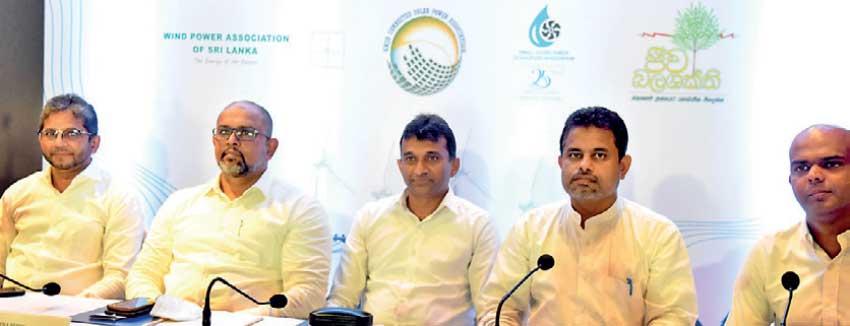26 Jan 2022 - {{hitsCtrl.values.hits}}

Renewable energy sector stakeholders at media briefing yesterday (from left) Wind Power Developers Association Secretary Manjula Perera, Small Hydro Power Developers Association President Thusitha Peiris, Ground Mounted Solar Developers Association President Lasith Wimalasena, Bio Energy Developers Association President Chamil Silva and Solar Industries Association President Kushan Jayasuriya
Pic by Kithsiri De Mel
By Shabiya Ali Ahlam
The renewable energy developers in the country yesterday called on the government to support the sector by turning the promises made into action, since the only solution to Sri Lanka’s ongoing power crisis is to increase the contribution of renewable energy sources.
President Gotabaya Rajapaksa, soon after taking office, announced Sri Lanka’s target towards meeting 70 percent of the country’s power demand via renewable energy sources by 2030. However, little progress has been reaching that ambitious goal.
The need to boost the contribution of renewable energy sources to ensure uninterrupted power supply is evident now more than ever. The public and business community are being inconvenienced in their day-to-day activities, a group of renewable energy developers pointed out.
The first step towards fast-tracking the implementation of renewable energy projects is to firm up the cooperation between the government and private sector at the earliest, the developers said while addressing journalists in Colombo yesterday.
At present, a total of 294 private sector renewable energy projects, with a combined capacity of 718.334MW, have been commissioned. For the country to fully reap the benefits of renewable energy, the number of projects needs to drastically increase, the renewable energy stakeholders said.
A key challenge in the projects being implemented is the red tape in the approval process, which sometimes takes even years to complete.
“The process needs to be streamlined and implemented in an efficient manner. We run into a myriad of challenges from the Ceylon Electricity Board (CEB) that has delayed approval and grid connections, sometimes attributed to incorrect technical analysis,” said Small Hydro Power Developers Association President Thusitha Peiris.
Bringing in the correct knowledge and international best practices to the CEB would resolve the bulk of the issues faced at present in the renewable energy space, he added.
Due to the prolonged delay in obtaining approvals, several investors, even those who only required the final approval from the CEB, have taken their finances to other sectors, said Peiris.
Hampering the success of the renewable energy sector is also the imposed import restriction, which has made it increasingly difficult to obtain the necessary machinery.
Of the total value addition component in the development of renewable energy, about 65 to 70 percent is done with the technologies available in Sri Lanka, whereas the remaining 30 to 35 percent is done with technologies imported.
The restrictions add to the woes of the industry by further slowing it down,” shared Small Hydro Power Developers Association Past President Prabath Wickramasinghe addressing the media at the same event.
Furthermore, the CEB is yet to settle to the renewable energy sector stakeholders, excluding those engaged in the development of solar power, a sum of about Rs.25 million.
The last payment received was in June 2021, after which no indication has been made with regard to the payment of due.
Holding back payments discourages private sector stakeholders in developing the renewable energy sphere and also makes it difficult to steer forward.
16 Nov 2024 14 minute ago
16 Nov 2024 20 minute ago
16 Nov 2024 26 minute ago
16 Nov 2024 32 minute ago
16 Nov 2024 3 hours ago